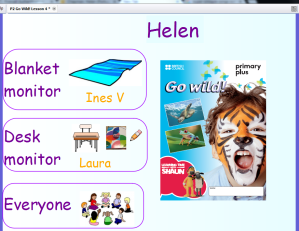
As the end of term draws near, all teachers get worn out- especially if you teach young learners. Here´s some suggestions of what you can start doing now to stop you wearing yourself too thin by June.
Protect your voice
I never, ever raise my voice, but my throat always gets sore near the end of term. Not only do I sing and chant a lot in class, but getting run down always affects my throat. If you´re the same, why not try and use your voice a little less by:
Developing class routines
Class routines are not only a mine for language, but once the children are familiar with them, they require little speaking on your part- especially if the children are able to take the teacher role from you.
Giving the children roles
Children love having a job to do! I like to have ´monitors´. At the start of each lesson, I show a slide with different monitor roles (see below). Eventually the children know to check the board to see their role.

I also give one child the role of putting stickers on everyone´s work, after I´ve checked it.
Remember to keep a record of the roles the children have had, or they´ll find it unfair.
Save on planning time
Planning more wisely means you´ll (hopefully) spend less time at work, and more time in the real world!
Re-use materials
Just spent 30 minutes cutting up those small images for a matching game? Why not look at your lesson plan and think of three other ways you could use those same little cut-ups. This way, that 30 minutes preparation time goes further. Even better, why not try and re-use them in the following lesson?
Play games
Make up a bank of simple games that you can use again and again, with any lesson theme. See here for one great idea.
Prepare reports early
If you´ve been making observation notes each lesson, then you can use these as the basis for your reports. If not, why not spend ten minutes after the next three lessons making quick notes on each child. Think about:
- activities the child seemed to particularly enjoy
- specific stages of the lesson they were really engaged in
- how well they worked individually, with a partner, or as a whole group
- anything else of note
After three lessons, you´ll have a profile of each child that you can put on their report.
Get a planning buddy
Get together with a colleague who´s teaching the same level. Brainstorm some ideas for the weeks´ lessons, and share the printing/laminating/cutting up of the materials. Not only will this save you time during preparation, but you´ll end up trying out different activities and games that your colleague suggests. Doing this planning session over a coffee is also a good way to check in on each other´s well-being and mental health.

In the lessons
Remember to engage
Sometimes we get so focussed on meeting our lesson aims, we forget to engage with the children in a genuine way. No matter how burnt out you feel, remember to value every child´s contributions, and react to things genuinely. These authentic interactions will lighten your mood.
Student-centred activities
Try and plan activities that are less teacher-centred. Pair work is a good way to take the focus off you.
And on the last week of term
Try and work a little less hard in the final week of term, when your energy levels (and patience) will be running low.
Use the same materials
Think of games, activities and materials you could use with different levels and groups. For example, you may be able to make one set of flashcards that you can use with both pre-primary and lower primary-aged groups. You could even prepare one lesson, but grade the end task according to ability/maturity. If you choose a theme which is quite general (e.g. summer activities or holiday vocabulary), it can be appropriate for all young learner groups. This will really save you on preparation time in your last week.
Go outside

If your school has a garden, you could take the children outside for part of the lesson. You could even plan some lesson content related to this (e.g. finding different shapes in the garden).
Being away from the same four walls will reinvigorate you, especially if you can get some vitamin D.
Have a party
In the penultimate lesson, why not have the children make party hats, bunting, and invitations for a party on the last lesson? In the last lesson you could play classic party games like pass the parcel and musical statues. The parents could even come in for the last twenty minutes, and your group could sing the songs you´ve learnt together.